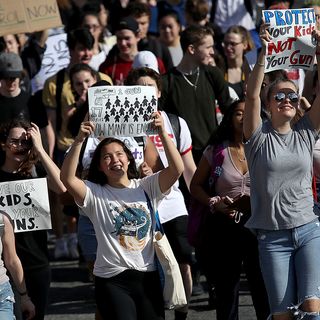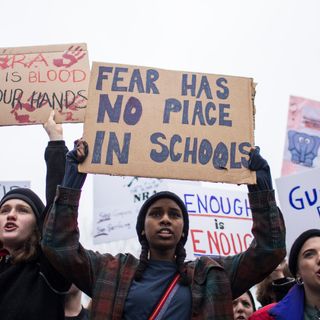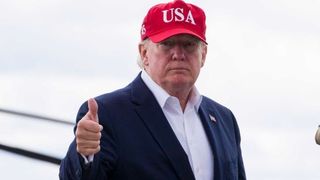It was hard enough to go to sleep — safely — on Saturday night here in the US following the day-long, non-stop coverage of the gun massacre in El Paso, Texas where 20 people were murdered and scores injured in a Walmart packed with shoppers ahead of the new school year.
We heard the usual litany of "thoughts and prayers" from political leaders for the victims, and praise — so deserved — for the first responders. All too little, too late, coming just six days after a massacre that killed three, including two children, in California.
But to wake up Sunday morning to news of the overnight atrocity in Dayton, Ohio, with nine more killed and dozens injured, the realisation hits — again: there is no stopping this.
The easy access to guns places America as the world's outlier in gun violence; the easy resort to firearms means the killings will continue on any day, in any city.
With more than one gun for each of the 330 million Americans, the issue is plain. The easy access to guns places America as the world's outlier in gun violence; the easy resort to firearms means the killings will continue on any day, in any city.
The authorities always search for motive, and the cause. But the oft-cited triggers — mental illness, white nationalist domestic terrorism, video games, personal trauma and desperation — have outlets because of the easy access to guns. Yes, those triggers exist. But they are expressed through guns — far more lethal than any other weapon.
The first reports of the shootings in El Paso indicated there was more than one shooter. That report was incorrect, because what witnesses saw were other Texans with firearms pulling them out in response to the attack. In America, you never know, as you walk down the street, how many other people within your eyesight are carrying weapons. There are fewer unarmed passers-by on that street than you might think. El Paso is also in Texas, where Governor Greg Abbott in 2015 said he was "embarrassed" that Texas had fallen behind California in gun purchases.
The issue is not criminals pouring across the border or Islamic terrorists or immigrants from choose-your-obscenity countries. It is too many guns.
When 'enough is enough' isn't enough
Then-president Barack Obama felt the killings in Newtown Connecticut in 2012 that claimed 26 lives — including those of 20 children — constituted the worst day of his presidency. And he could not recapture the souls lost, in an America lost, even when singing Amazing Grace in Charleston South Carolina in 2015 at the funeral of the pastor killed in his church — along with eight others — at the hand of a white supremacist.
Ever wondered why the US refuses to act on guns? This is why

One would have thought that in a vigorous democracy, when communities across the nation, and their leaders say: "Enough is Enough," that something would be done. But the power of the National Rifle Association (NRA), and the DNA of the Republican Party, simply find the Second Amendment untouchable.
The right to life proclaimed by so many American leaders does not enjoy any parity under the Second Amendment. Only last week, days after the California massacre, at his rally in Cincinnati, Ohio — the state where nine would die two nights later — Mr Trump said:
"We will defend privacy, free speech, religious liberty, and the right to keep and bear arms. And just remember, with the Democrats, there is no Second Amendment. You can forget about 'keep and bear arms'."
In his remarks to the nation on Monday, Mr Trump missed the target of what needs to be done. Condemning white supremacy and hate crimes, addressing mental health, video games and the internet — all necessary but not sufficient.
The only thing that would have truly begun to make a difference in the trajectory of gun violence is if the President directs his officials to work with Speaker Pelosi and Senate Leader Mitch McConnell to craft a gun control package — and McConnell agrees. The House already passed last February a mandatory background-check bill. But Trump failed to make that call today.
Explainer: Why can’t the United States enact Australian-style gun control?

What role can Australia play?
Does Australia, as the strongest of US allies, have a role here? Yes it does. What John Howard did after the 1996 Port Arthur massacre remains the gold standard in gun control in Western societies. And it worked.
And the former prime minister has been steadfast in counselling all his friends and allies in the US, including staunch Republicans, to emulate the Australian example.
This was robustly reinforced by the courageous stance of New Zealand Prime Minster Jacinda Ardern following the horror of Christchurch earlier this year. She was unrelenting in implementing the Howard example — and took it to new levels through the Christchurch Call to combat online extremism.
It has been suggested by Australia's former deputy prime minister Tim Fischer that Australia communicate its firm disapproval of America's gun culture, and the dangers it poses, by instituting a DFAT travel advisory for Australians visiting the US.
While dramatic, this is unnecessary: Australians already know well the reality of gun violence in America today. In raw numbers, 40,000 Americans die from guns each year. More than 68,000 die from drug overdoses, including opioids. 40,000 die from automobile carnage. Over the past two years, it was the revolting gunshot murder of one Australian, Justine Damond Ruszczyk, that commanded attention. A travel advisory on guns in America serves no purpose.
Should Prime Minister Scott Morrison press Mr Trump on these issues when he gets to Washington? Emphatically, yes. The US has not signed onto the Christchurch Call. Speaking frankly to Mr Trump about what Australia has done and affirming solidarity with Ms Ardern and New Zealand: this could help give a boost to whatever positive steps may be underway in Congress in the wake of this horrific weekend in America.
That would be a real aid to a friend in urgent need of help.






